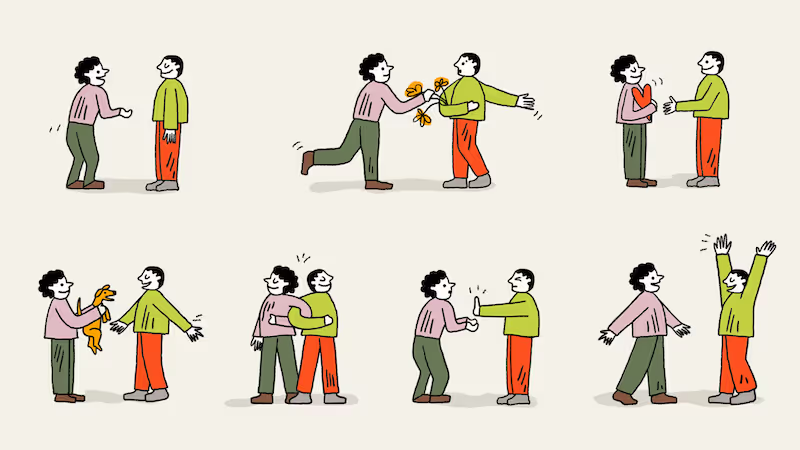People ask me daily: how do I find the right therapist?
Whether it’s individual, couples, or family therapy, the kind of therapist I always recommend is one who is challenging and direct but not judgmental; is open-minded and willing to let people explore options in life that are very different from their own. Someone who doesn't rush to diagnose and pathologize, and who has a keen understanding of the intricacies of intimacy and sexuality.
At the heart of therapy lies the relationship between the patient and the therapist, hence finding the right fit is key. There are innumerable modalities of therapy so, landing in a good place with a suitable approach is a process, but you must understand what it is you’re looking for before you start.
I was at university when I had my first appointment. The therapist sat quietly, waiting for me to talk. The more he waited, the less possible it felt to speak. Time dragged on, painful silence filling up the entire session. It was a terrible standoff during which I could only think, what is wrong with me?
The only thing that was “wrong” was that I didn’t know what to expect. I had only dimly asked myself what I was looking for and I had no idea what to ask the person across from me. All I knew was that I felt bad. It's easy to blame the therapist and say that he did nothing, but it’s also important to acknowledge that I did nothing. Eventually, I left thinking that I wasn’t good at this. Today, I think otherwise. A roadmap, such as the one that follows, can make all the difference.
The Self-Interview
Answer these questions for yourself first.
- Why therapy and why now?
- What would you like to work on?
- What is your desired outcome?
- What are you prepared to do to achieve this goal?
- What do you expect from your therapist?
- What have been your experiences in therapy so far, and what was useful? What was not? What are the lessons you have gleaned?
Finding & Financing
You cannot get out of emotional pain and create economic strain.
If you have health benefits, consult your handbook or call your provider to see what procedure to follow. Are you bound to working with an in-network provider? Do you need a referral from your GP? Do you get reimbursed from your insurance for outpatient mental health? How many sessions and how much per session?
Once you have that information, the search begins. If you are in an area where you do not know anyone who can refer you or make a recommendation, professional organizations such as the American Family Therapy Academy, Society for Sex Therapy and Research, and American Association of Sex Educators, Counselors, and Therapists have websites with member listings by city, specialty, and experience. Fees are often listed as well. Your General Practitioner can help, too.
Most therapists today have websites, blogs, and newsletters. Take a look. You can learn a lot about the practitioner from how they present their work, and how they talk about certain topics. When you look at their website, you can see how long they’ve been in practice and if they’re licensed.
Go for the most experienced person you can afford. And know that expertise with your particular issues is more important than the letters after the name.
If you are uninsured, a good and inexpensive way to get help as an individual, couple, or family is to go to a training institute. When I taught at New York University Medical Center, the therapists were early in their training but they were under direct supervision from experienced clinicians and teachers.
I always recommend people test out two or three therapists to get a sense of how differently each work from one another. You can even start those sessions differently by focusing on different parts of your history.
The Consultation Interview
Ask direct questions and get clarity before you even make an appointment.
- Does the therapist have experience working with your particular issues? Whether you are dealing with an eating disorder, trauma, addiction, grief, anxiety, sexual pain, or domestic violence (to name a few), it’s important that you work with someone who knows your problem.
- Likewise, if you are looking for couples’ therapy to address sexual challenges, ask if the therapist has experience working in both areas.
- If you identify as LGBTQA+, you may want a therapist who has experience working with LGBTQA+ patients. This is a personal preference.
- Ask how long have they been in practice, what kind of training they have, and if they are a licensed therapist.
- Share your answers from your “Self-Interview,” and ask the therapist for their understanding of your situation. You can also ask:
- How do you envision our work together?
- How do you describe your approach?
- Do you specialize in any of the areas that I grapple with?
You may be wondering if it’s okay to ask personal questions. It is! And it is up to the therapist to decide what is appropriate to share when responding. I once saw a couple in which the woman, from New York, wanted me to assure her of my academic credentials, while the man, a Mexican immigrant, wanted to know was if I was married, if I had children, and if I had any experience with divorce. In order to establish trust, he needed to know about my life experience, not my academic record. For many people, therapy is still filled with stigma and talking to a stranger is a bizarre practice.
When I train therapists, I always remind them that, after the patient has told you so much about themselves in so little time, it is incumbent that the therapist offer the patient the opportunity to ask them about themselves and their work. I prefer that type of collaborative stance.
Evaluating Your First Session
First and foremost is the fit.
In your first session, you want to experience comfort. You want to feel the therapist has empathy, understanding, and the ability to see ahead of you. They should challenge you to open your vista. A good first session should offer a glimpse of how things can be different from how they have been.
Consider whether your therapist was active or passive, and determine which you prefer. Some therapists will inquire about your history and will guide the conversation, others will let you drive it. A good therapist will refrain from making quick assumptions and will want to understand more fully before intervening. A good therapist should also stop you from drifting and rambling.
Your therapist should assure you in the first session that this is a confidential process and that they will protect you and your boundaries. You need to be able to speak the truth or else the process will be compromised. But know that therapists are required to report it if there is risk of violence or suicide.
Ultimately it takes time to evaluate if a specific therapist is right for you, but at some point, you want to feel that you are being helped, that you are experiencing relief or change.
Evaluating The Therapeutic Relationship
After a few sessions, check in with yourself.
My mentor, Salvador Minuchin, talked about how therapy was a combination of empathy and challenge, of kick and stroke, as he called it. If you have a therapist who is constantly validating what you feel and doesn't challenge you, it’s all stroke and no kick. And if you have a therapist who is only challenging you—or if you feel like they’re not rooting for you—that’s problematic. This is even more important if you are a person who isn’t used to feeling supported. You need the kick and the stroke.
It may not be a good fit if:
- you’re coasting and sessions function just as a check-in.
- your therapist seems threatened by your desire to look into other means of self-care.
- your therapist and your partner often gang up on you.
- your therapist and you often gang up on your partner.
- your therapist rushes to immediate conclusions, or is not in tune with you.
Therapy is a conversation and a collaboration and a therapist is not an all-knowing person that has the truth about you and your life. It is healthy to evaluate your therapeutic relationship, and a good therapist will welcome a conversation about any concerns. It may take a few attempts to find the right therapist, but doing so will change your life.
Other FAQs
How do I know which type of therapy I should do? Research different modalities, but consider this: if you’re a person that needs to learn to sit with their feelings because you’re always driven to action, you will need a therapist that can help you anchor into your thoughts and feelings. If you’re a person who is more inclined to ruminate and obsess and overthink, you may need someone who helps you to get in touch with your feelings and action. Ironically, we often are inclined to seek the form of therapy that matches our defenses rather than help us change it. It’s important to find the balance.
Is there a therapist I can see online (i.e. if I'm in a remote area)? Yes, many therapists offer Skype or Zoom sessions. There are also apps such as Talkspace, which can be useful, however whenever possible, in-person is the way to go.
Can a therapist prescribe me medications? If medication is called for, I highly recommend it be prescribed by a psychiatrist rather than a GP for the same reason I don’t buy bread at a butcher. A good therapist can discuss medication with you and recommend a psychiatric consultation, but psychiatrists are the only ones in the mental health field who can prescribe psychotropic medications. That said, the professionals who care for you need to be in conversation every once in awhile to coordinate treatment.
If I see my therapist outside the office, what should I do? I usually take my cue from the patient. If they say hello, I say hello. Maybe I smile and say that we will have lots to talk about. Some people will be offended if they are approached; others will be offended if they are ignored. We must be flexible and use sensitivity. For me, these are situations that will be fodder for deepening the therapy and the relationship.
Correction: An earlier version of this article contained a statement based on incorrect information. It has been removed. I appreciate the kindness and respect with which a number of you have pointed us to this mistake. I like to stand corrected.








.svg)





